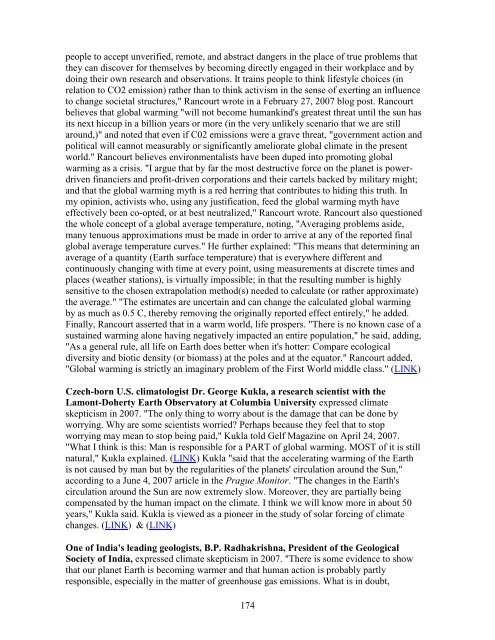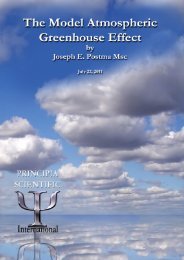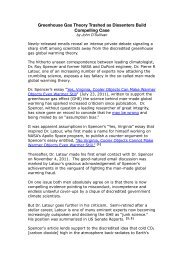Than 1000 International Scientists Dissent Over Man-Made Global ...
Than 1000 International Scientists Dissent Over Man-Made Global ...
Than 1000 International Scientists Dissent Over Man-Made Global ...
You also want an ePaper? Increase the reach of your titles
YUMPU automatically turns print PDFs into web optimized ePapers that Google loves.
people to accept unverified, remote, and abstract dangers in the place of true problems that<br />
they can discover for themselves by becoming directly engaged in their workplace and by<br />
doing their own research and observations. It trains people to think lifestyle choices (in<br />
relation to CO2 emission) rather than to think activism in the sense of exerting an influence<br />
to change societal structures," Rancourt wrote in a February 27, 2007 blog post. Rancourt<br />
believes that global warming "will not become humankind's greatest threat until the sun has<br />
its next hiccup in a billion years or more (in the very unlikely scenario that we are still<br />
around,)" and noted that even if C02 emissions were a grave threat, "government action and<br />
political will cannot measurably or significantly ameliorate global climate in the present<br />
world." Rancourt believes environmentalists have been duped into promoting global<br />
warming as a crisis. "I argue that by far the most destructive force on the planet is powerdriven<br />
financiers and profit-driven corporations and their cartels backed by military might;<br />
and that the global warming myth is a red herring that contributes to hiding this truth. In<br />
my opinion, activists who, using any justification, feed the global warming myth have<br />
effectively been co-opted, or at best neutralized," Rancourt wrote. Rancourt also questioned<br />
the whole concept of a global average temperature, noting, "Averaging problems aside,<br />
many tenuous approximations must be made in order to arrive at any of the reported final<br />
global average temperature curves." He further explained: "This means that determining an<br />
average of a quantity (Earth surface temperature) that is everywhere different and<br />
continuously changing with time at every point, using measurements at discrete times and<br />
places (weather stations), is virtually impossible; in that the resulting number is highly<br />
sensitive to the chosen extrapolation method(s) needed to calculate (or rather approximate)<br />
the average." "The estimates are uncertain and can change the calculated global warming<br />
by as much as 0.5 C, thereby removing the originally reported effect entirely," he added.<br />
Finally, Rancourt asserted that in a warm world, life prospers. "There is no known case of a<br />
sustained warming alone having negatively impacted an entire population," he said, adding,<br />
"As a general rule, all life on Earth does better when it's hotter: Compare ecological<br />
diversity and biotic density (or biomass) at the poles and at the equator." Rancourt added,<br />
"<strong>Global</strong> warming is strictly an imaginary problem of the First World middle class." (LINK)<br />
Czech-born U.S. climatologist Dr. George Kukla, a research scientist with the<br />
Lamont-Doherty Earth Observatory at Columbia University expressed climate<br />
skepticism in 2007. "The only thing to worry about is the damage that can be done by<br />
worrying. Why are some scientists worried? Perhaps because they feel that to stop<br />
worrying may mean to stop being paid," Kukla told Gelf Magazine on April 24, 2007.<br />
"What I think is this: <strong>Man</strong> is responsible for a PART of global warming. MOST of it is still<br />
natural," Kukla explained. (LINK) Kukla "said that the accelerating warming of the Earth<br />
is not caused by man but by the regularities of the planets' circulation around the Sun,"<br />
according to a June 4, 2007 article in the Prague Monitor. "The changes in the Earth's<br />
circulation around the Sun are now extremely slow. Moreover, they are partially being<br />
compensated by the human impact on the climate. I think we will know more in about 50<br />
years," Kukla said. Kukla is viewed as a pioneer in the study of solar forcing of climate<br />
changes. (LINK) & (LINK)<br />
One of India's leading geologists, B.P. Radhakrishna, President of the Geological<br />
Society of India, expressed climate skepticism in 2007. "There is some evidence to show<br />
that our planet Earth is becoming warmer and that human action is probably partly<br />
responsible, especially in the matter of greenhouse gas emissions. What is in doubt,<br />
174





